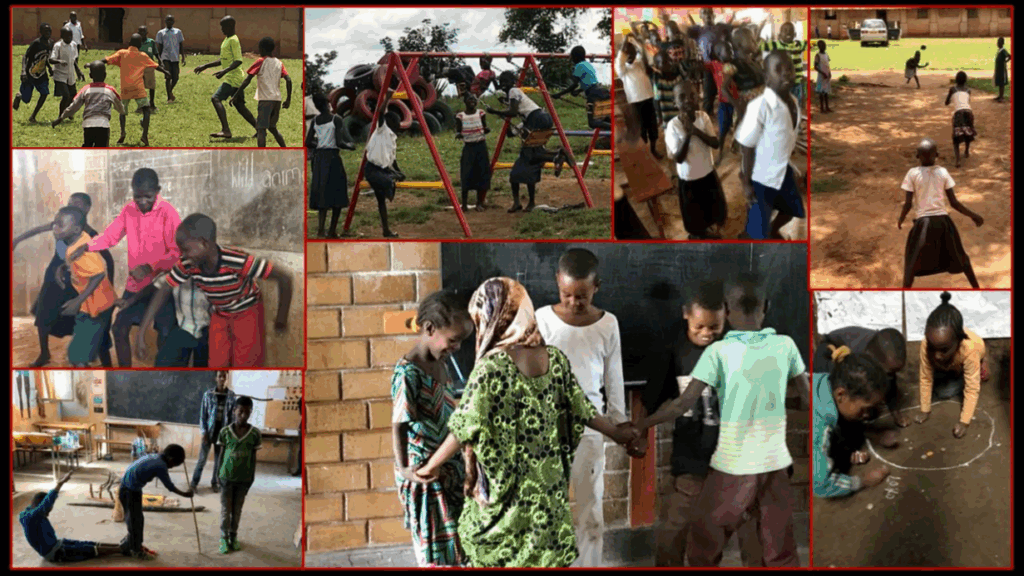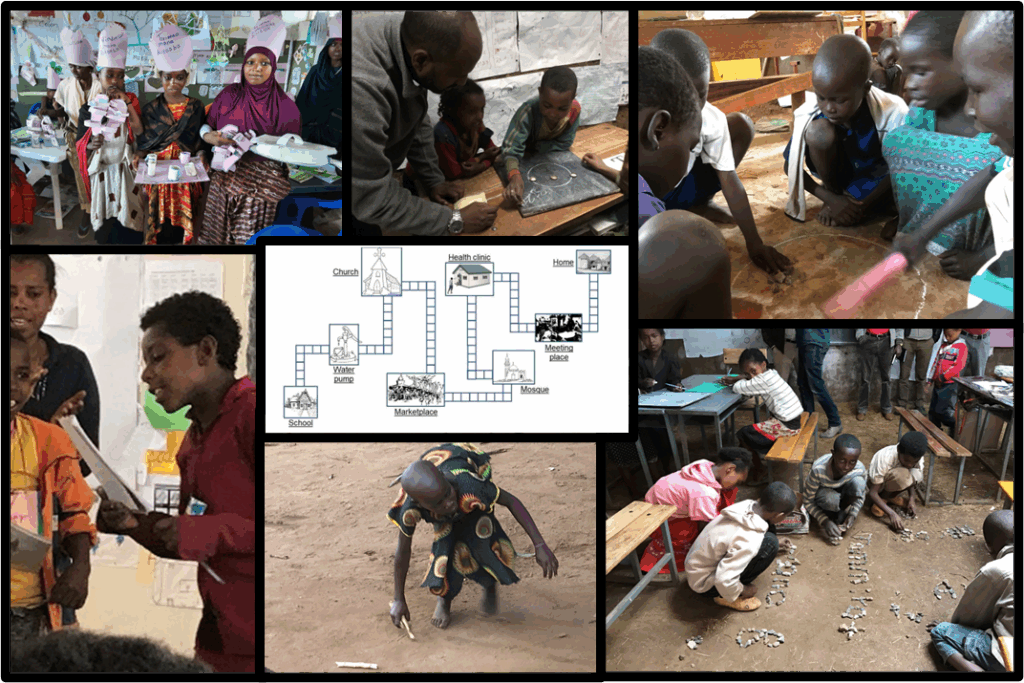June 11 marks the International Day of Play, a global observance established by the United Nations in 2024 to recognize play as a fundamental right for every child. Advocated by a coalition of organizations including UNICEF, Right to Play, and the LEGO Foundation, the day calls attention to the essential role of play in children’s learning, development, and well-being.
At Geneva Global, we see benefits of play every day in our Speed School classrooms. An accelerated education program, Speed School continues to draw the attention and accolades of government and other partners not just in the two countries where Geneva Global operates the program – Ethiopia since 2011 and Uganda since 2016 – but also far beyond. This reaction derives naturally from the successful learning that many studies (e.g., 2018; 2023; 2025) show that Speed School “graduates” bring with them as they transition into mainstream classes and continue throughout their formal education.
Even more compelling than the data is what visitors observe when they step into a Speed School classroom. There, they find students who are busily working together and alone, focused on motivating tasks to discover and demonstrate knowledge while cultivating their academic, practical, and personal skills. This is learning that aligns almost perfectly with the six characteristics of play outlined by Rachel White for the Minnesota Children’s Museum (2012). Learning in Speed School classes is:
- Pleasurable
- Intrinsically motivated
- Process oriented
- [Often] freely chosen (at least in how they learn if only sometimes in what they learn)
- Actively engaging
- Non-literal
The core philosophy and practice driving instruction in the Speed School classroom are that children learn best when they engage actively and together with the content of their lessons. Instruction is designed to build on students’ existing knowledge while connecting learning to their real-world settings and their shared and individual motivations. The aim is to make learning resemble how children learn in play and independently, outside of school, rather than subject them to the dull drudgery of most conventional classrooms.
Seated in small groups to favor peer learning and assessment, students learn the official curriculum holistically, honing simultaneously their intellectual, practical, and socioemotional skills and knowledge. Speed School facilitators generate such learning by relying on a standard set of pedagogic practices:
- Abundant use of low- and no-cost learning materials
- Simulations
- Physical movement and activities
- Discovery and inquiry
- Learning games
- Art and music
- Storytelling
- Projects
Speed School facilitators routinely use one or more of these play-based approaches to create and conduct highly learner-centered, active, stimulating lessons to equip students academically, practically, and personally to excel in their future studies. At the same time, it helps them begin to identify and cultivate their passions and talents while pointing them in directions to pursue these into life and livelihood.
This emphasis on joyful, purposeful learning reflects strongly what the International Day of Play seeks to promote around the world. On this International Day of Play, Geneva Global is proud to celebrate our many colleagues and partners who bring the excitement and joy of play into the classroom to support and stimulate students for future fulfillment in all aspects of their lives.
Read on to learn how facilitators use each of these pedagogic practices in their Speed School classes.
Abundant use of low- and no-cost learning materials

Pupils, facilitators, and even parents contribute to creating and gathering a wide range of no- and low-cost materials to enrich teaching and learning. These may include: (i) letters, words, numbers, and calculations written on cards (with drawings), shaped from natural or repurposed materials, and inscribed on different surfaces; (ii) models of animals, household items, food, etc. made of clay, cardboard, and other recycled and natural items; and (iii) bottlecaps, plant seeds, pebbles, and other items for counting, writing letters, and drawing pictures. These are displayed and available on every surface of the Speed School classroom, including all four walls, the ceiling, the floor, and any shelf space.
Simulations

Pupils solidify their learning by participating in simulations drawn usually from everyday life that they usually create themselves. These include: (i) a mock store where pupils conduct transactions and calculations to purchase food and other common items; (ii) other economic simulations, such as a mock bank, a coffee shop, and even plowing fields; (iii) skits or other play-acting; and (iv) small-scale productive activities, such as an actual garden and model items including furniture, clothing, weaving, and food preparation. Such activities occur within and outside the classroom.
Physical movement and activities

Learning in the Speed School class incorporates physical activity within lessons to promote holistic learning and, at moments, to help pupils to “re-charge” their learning “batteries.” Examples include: (i) using physical gestures to reinforce content from language, math, and other lessons; (ii) clapping, stomping, shaking various body parts, to support the counting and spelling, and other learning or simply to expel pent-up energy; and (iii) pupils’ shaping letters or numbers with their bodies to form words or equations.
Discovery & inquiry

Speed School facilitators guide pupils to learn on their own by encouraging them to ask questions, make observations, and experiment and then to organize and analyze what they learn to share via different media. Strategies include: (i) planning and then venturing into nature, the community, work settings, and elsewhere to learn about some topic from the curriculum; (ii) interacting with local experts to learn about different sectors—economic, social, political, cultural, traditional, etc.; and (iii) designing and carrying out experiments. The learning activities aim to foster students’ skills and motivation for lifelong learning.
Learning games

Pupils play games as a whole class and in small groups to reinforce and deepen their learning. These may include: (i) memory games, such as matching images hidden on overturned cards and naming items from a category—e.g., food, plants, and animals—in succession without repeating, often counting at the same time; (ii) tossing pebbles onto drawn circles to create random calculations; (iii) playing traditional games involving counting, naming, and strategy; and (iv) making up stories as a group, with each pupil’s taking a turn to add a sentence or part. Whether collaborative or competitive, games help pupils stay engaged and motivated to learn.
Art and Music

Although Art and Music are treated as separate subjects in the official curriculum, Speed School weaves them into lessons across academic topics. This may involve: (i) drawing, creating posters, developing “thinking maps,” etc.; (ii) singing songs learnt from the facilitator or at home, often accompanying themselves on instruments they have made; (iii) creating their own songs to perform; and (iv) decorating the classroom with artistic writing or using natural or found materials to model the alphabet, words, numbers, and even equations. Music and Art almost always link to curricular content and are definite favorites among pupils and facilitators alike.
Storytelling

Speed School facilitators use storytelling to support both language development and content learning while nurturing their pupils’ creativity, imagination, and critical thinking, among other personal competencies. Some ways they do this are: (i) beginning every school day with students’ sharing the “news of the day,” reporting something they have recently observed or heard; (ii) reading stories aloud on familiar or new topics followed by discussion, inviting questions, stimulating debate, and encouraging pupils to re-enact the story in artistic, musical, and dramatic ways; (iii) creating opportunities for pupils to create and share their own stories; and (iv) inviting community storytellers to share traditional tales.
Projects

Project-based learning gives Speed School facilitators and pupils the opportunity to work in groups over time to plan, complete, and present a hands-on project. This approach integrates academic, practical, and personal learning goals in an engaging, student-led way. For example, Speed School students: (i) conduct some economic activity, such as in agriculture, food, a service, or crafts; (ii) formulate and lead a social or environmental initiative, such as a health or safety campaign; (iii) create a classroom learning resource, such as a mock bank, fake store, or a cardboard “television;” and (iv) organize a class excursion or event, such as a concert, play, or sports match.
For more information contact: [email protected].
Learn more about education at Geneva Global at: www.genevaglobal.com/education.